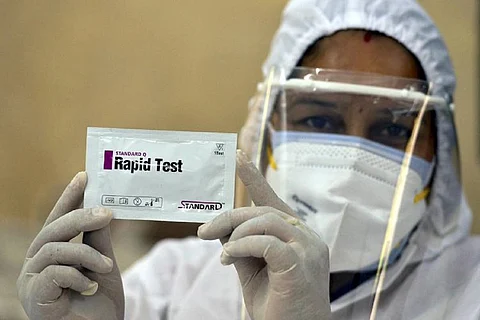

Since the start of August, the number of RT-PCR (reverse transcription-polymerase chain reaction) tests for the novel coronavirus in Karnataka have fallen significantly, well below the testing rate recommended by the state’s own high-level technical committee of expert doctors.
According to the daily bulletins released by the Department of Health and Family Welfare, the number of RT-PCR tests done between August 1 and August 5 are 14,500, 9,915, 12,970, 15,904 and 13685, respectively.
In comparison, the last five days of July saw a much higher number of RT-PCR tests between July 26 to July 31. The daily number of RT-PCR tests for the period were 17,607, 15,995, 21,380, 18,516 and 21,034 respectively.
Considering this, RT-PCR testing has decreased by 27,558 overall or roughly 5,112 tests per day in the first five days of August, compared to the last five days of July.
Incidentally, since the start of August, the number of antigen tests have gradually increased with the seemingly gradual decline in RT-PCR tests. While increase in antigen-based tests is welcomed by independent experts, the underutilisation of the RT-PCR testing infrastructure has been questioned by experts outside the state given its greater efficacy.
As reported earlier, antigen tests are much cheaper and can give results within 30 minutes, as opposed to eight hours taken for RT-PCR testing; however, their efficacy is thought to be only 50%. Antigen tests also do not need to be used within a laboratory environment, nor do they pose a biosafety hazard.
According to Delhi-based microbiologist Dr Navin Dang, this is a worrying phenomenon taking place across the country.
“While ideally every negative result on an antigen kit should be confirmed by a RT-PCR test, this may not be practically possible to carry out due to numerous constraints. Often, people may be sceptical about giving their samples twice. I absolutely believe that all facilities for RT-PCR testing should be efficiently used, but I can understand the convenience of antigen-based kits. But the disadvantage of over-reliability will lead to more false negatives. This will not only lead to further increase of missing patients, but also spread of the disease,” he told TNM.
Dr Jacob John, virologist and former professor at the Christian Medical College (CMC), Vellore, said that he would be cautious to criticise the state government's decision on the issue but underscored the importance of RT-PCR tests.
“While there can be false negatives in RT-PCR tests too, it is essential in contact tracing exercise to test for pre-symptomatic and asymptomatic contacts of patients who have already tested positive,” he told TNM.
Speaking to TNM, Dr CN Manjunath, member of Karnataka’s technical committee and the nodal officer for COVID-19 testing in the state, accepted that there is an issue of undertesting.
He said that ideally, given the resources available, the state should do a minimum of 20,000 RT-PCR tests and 20,000 rapid antigen-based tests daily.
However, Dr Manjunath said that there should not be any significant issue of false negatives.
He reasoned, “If the rapid test shows a positive result, there is no need for confirmation. There is also no need to doubt negative results from asymptomatic persons also. Only if a symptomatic person tests negative, then we need to do a confirmatory test. So, for this, officials have been instructed to collect swab samples of such patients to avoid any doubts. This is the protocol that is being followed.”
Govt response
When asked why the RT-PCR tests have been significantly low in recent days, state Health Commissioner, Pankaj Kumar Pandey, told TNM, “Last few days we have increased the numbers again, and we will increase the daily testing further.”
He, however, did not respond on why there is a drop in RT-PCR tests but denied paucity of adequate manpower or physical resources.
State COVID-19 War Room-in-charge and senior IAS officer Munish Moudgil also failed to provide a reason for why the numbers have gone down.
He said, “The state government’s idea is to do maximum tests to detect patients early to prevent deaths by COVID-19. All with symptoms like fever, breathlessness, cough or sore throat are requested to get tested immediately.”
He added, “Nothing should be read with the drop in numbers and efforts are on to increase the daily number of RT-PCR tests.”